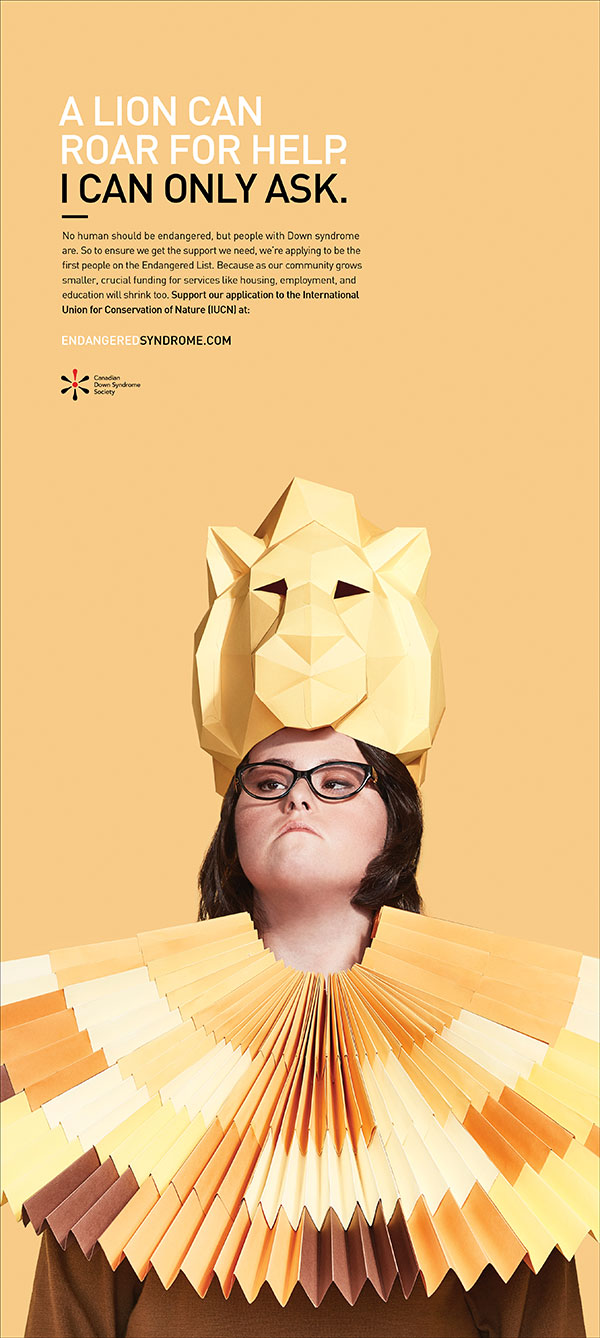Why are these people dressed like animals? It's best that they explain themselves.
For the Canadian Down Syndrome Society, FCB Canada gives us "Endangered Syndrome." This is a follow-up to the previous, well-received initiatives "Down Syndrome Answers" and "Anything but Sorry."
In essence, the group is applying to be the first people on the International Union for the Conservation of Nature (IUCN)'s Red List of Threatened Species. This campaign outlines why.
High-pressure societies, where worth is decided on market-friendly performance, tend to be ableist for obvious reasons. Every parent wants what they consider to be a perfect kid.
As a result, tests increasingly offered to pregnant women that check for disorders like Down syndrome increase abortions of those fetuses. Countries like Iceland now have almost no Down syndrome births at all. In the U.S. in recent years, 30 percent fewer people have been born with the syndrome than initially projected.
It's not terrible to want to give your kids a head start. But as the Down syndrome community shrinks, so too does social and community support, and the number of voices that can speak for them. Below, we learn it can take people with Down syndrome decades to find appropriate housing.
"As a parent of an infant with Down syndrome, being a part of this campaign is important not only in raising awareness, but also in creating change to ensure my daughter and other people with Down syndrome live healthy, happy and productive lives," says Kylie Samson, who's the mother of Ava, the 6-month-old girl who's dressed as a sea turtle in these videos.
What's more, two out of three Canadians with developmental disabilities are out of the workforce, and are more than twice as likely to be living in poverty—as we learn here:
There's a kind of sense in trying to become the first humans inducted to the endangered species list. In the same way people rally to protect rapidly disappearing animals, it only stands to reason that we'd do the same for our own, thus ensuring funding, protections and government intervention.
Right…?
Yet there's an unavoidable tension in this campaign. Should facts like decreasing Down syndrome births, and the higher likelihood that people with Down syndrome live in poverty, be given equal weight? Can they expect equal responses of alarm? Among prospective parents, one of those facts lends rationale to the other.
Animals get put on the IUCN's list because we're trying to lift their numbers. Inviting this comparison to people with Down syndrome also risks stigmatizing those who make the decision to abort children with disorders, for whatever reason. Yet this question is one that "Endangered Syndrome" naturally raises.
In other words, while the intentions are clearly good, the metaphor isn't simply parsed—it invites a larger, more complex conversation. What can be addressed is the fact that people who have Down syndrome don't receive sufficient support, and stigma toward the disorder will only worsen as numbers dwindle.
"You may not think about it, but the reality is that people with Down syndrome face far more challenges than most of us, and they need more support than they're getting, says Laura LaChance, board chair of the Canadian Down Syndrome Society.
"Whether it's underfunded support programs for education, higher rates of unemployment, extended waitlists for appropriate housing, or even just negative public perception and stigma, the challenges faced by people with Down syndrome aren't decreasing—they're increasing."
"Endangered Syndrome" went live to coincide with Down Syndrome week from Nov. 1-7. On top of the IUCN application and petition, the campaign will also produce videos and ads featuring people with Down syndrome representing endangered species.
Environmental lawyer Adam Chamberlain will help submit the CDSS's letter of application. Both the application and the public's support petition will be shared with the United Nations during World Down Syndrome Day on March 21.
"We wanted to find a provocative way to raise awareness around the need for funding and support for this incredible group of people," says Nancy Crimi-Lamanna, chief creative officer of FCB Canada. "We are proud to be partners with CDSS in this effort and hope the outcome is more protection for people living with Down syndrome."
CREDITS
Campaign Title: Endangered Syndrome
Client: Canadian Down Syndrome Society
Chair: Laura LaChance
Vice Chair: Ed Casagrande
Marketing & Communications Manager: Kristen Halpern
Governance Committee: Stewart Moffatt
Board Member: Ben Tarr
Creative Agency: FCB Canada
Chief Creative Officer: Nancy Crimi-Lamanna & Jeff Hilts
Group Creative Director: Andrew MacPhee
Sr. Art Director: Michael Morelli
Sr. Copywriter: Marty Hoefkes
Art Director: Cody Sabatine
Copywriter: Joseph Vernuccio
VP, Managing Director: Tracy Little
VP, Managing Director: Tim Welsh
Group Account Director: Ravi Singh
Account Supervisor: Olivia Selbie
Account Executive: Alex Kreinces
Agency Producer: Katherine Forester
Director of Project Management: Shandi Horovitch
Project Manager: Elizabeth Lane
Chief Strategy Officer: Shelley Brown
Planning Director: Eryn LeMesurier
Research: Paul Gareau, Kantar Millward Brown
PR: Shannon Stephaniuk, Glossy
Lawyer: Adam Chamberlain, Environmental Law
Articling Student: Chris Hummel
Production Company: Radar
Director: Scott Drucker
Producer: Katherine Forester
Line Producer: Sarah Kravetz
Director of Photography: Scott Drucker & Chet Tilokani
Camera Operator: Scott Drucker & Chet Tilokani
Editing House: Saints Editorial
Editor: Michael Ofori-Attah and Jason Grebski
Transfer Facility: The Vanity
Colourist: Andrew Exworth
Online Facility: The Vanity
Music House: Silent Joe
Music Track Director: Jody Colero
Engineer: John Hurlbut
Composer: Benjamin Pinkerton
Animation: Michael Medeiros
Costume Design: Lea Krpan & Nikola Milic
Website design: Happiness Saigon
Media Agency: UM Canada

















